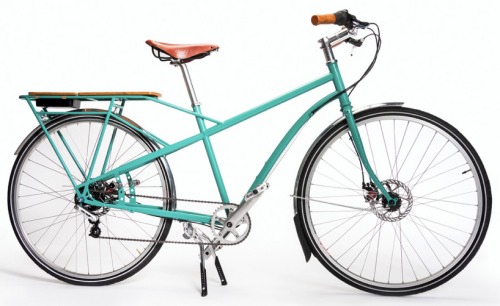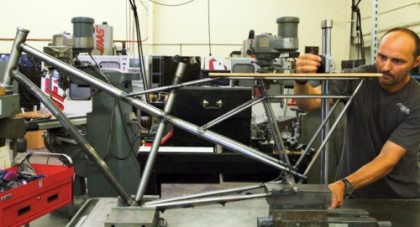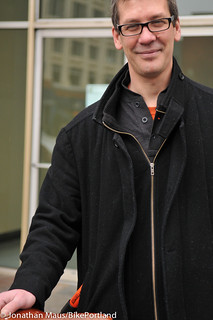
(Photo © J. Maus/BikePortland)
48 year-old Sellwood resident Alistair Williamson is like many other entrepreneurs with a passion for product design. When he set out to find a specific product and couldn’t; he decided to make it himself. For Williamson, the product was a bike that would be long enough for a child to safely ride on the rear rack, yet have a short enough wheelbase so it would fit on a bus or in an elevator. It also had to be strong enough to carry well over 100 pounds on the back, yet lively enough to be a fun-to-ride-everyday city bike.
Williamson’s quest to build that bike began in his basement in the fall of 2010. Next month he’ll start selling the Portland-made Midtail Flyer under the banner of his new company, Kinn Bikes.
The story of Kinn Bikes is as much about Portland as it is about Williamson’s personal quest. As he took the concept from idea to reality, he tapped into our city’s connected, supportive, and rapidly maturing manufacturing industry that is very well-suited to build bicycles.

(Photo: Tom LaBonty)
When I met Williamson back in February he was showing off his second prototype (neither the bike or the company had a name at that point). That bike was made by veteran local builder Joseph Ahearne. Ahearne’s early interest in the concept played a key role in proving to Williamson that the idea was worth pursuing. “After one conversation, he lengthened one of his jigs, and went for it,” Williamson recalled. The first prototype was built by another Portland builder, cargo bike maker Tom LaBonty.
LaBonty, who has built his share of cargo bikes, thinks the time has come for bikes like the Midtail Flyer. “People can see, and desire, the value of moving larger loads by bike; but for a lot of people, space, parking and storage are a deciding factor,” he says, “This style of bike has the potential to be a satisfying compromise… it feels like hatchbacks are on the cargo bike horizon. We got the mini-vans and station wagons, we have some trucks and recently we’ve seen a few sports cars — now here come the Subarus.”

Thinking back to those first prototypes, Williamson says he knew he was onto something when his grandkids loved riding on it. “It worked,” he said. What makes you say that? I asked. “Because my kids wanted to go faster, which was my clue that they felt safe.”
Below are a few photos of the finished product (including a shot of the nifty, lockable rear cargo box):




Williamson is a newcomer to the bike world. He came to the U.S. from the United Kingdom in 1988. He was working at Textronix as a systems engineer with their computer aided design tools. Wanting a change, he asked for a transfer to work at Tektronix in Beaverton, where worked for 10 years. After his career at Tektronix, he and a friend started a software company, which Williamson led as CEO during the high-tech boom in the late 1990s. Williamson says, that there was no eye-popping financial payoff for anyone, he learned a lot during the company’s rapid growth. “Then the high tech bubble burst, and there was a struggle to regroup afterwards,” he recalled.
In a change of gears, he went to work for Equal Exchange, a worker-owned coop that builds relationships with small farmers and brings their commodity products (like coffee, bananas, nuts and so on) to market. Williamson spent six years at Equal Exchange, designing the company’s financial systems. Now that he’s moved onto Kinn Bikes, this “designer at heart” says he’s happy to be working on something tangible again.
With success on his early prototypes and strong interest from biking minds he respected, Williamson was faced with the classic bike industry decision: Should he build the brand and have the bikes made overseas, or figure out a way to make them here in the U.S. His options for making them domestically were not great. There are some companies who could do the work, but none that would allow him to sell the bikes at the price point he hoped for (around $2,000 retail).
Then Zen Bicycle Fabrication set up shop in Portland. Zen, with a full staff of framebuilders and high-volume production capabilities, was just what Williamson needed (more on the company in our profile from last October).
Remembering back, Williamson said, “At that point, I might have let interest build, then ultimately have gone to Asia… But with Zen in town…”
Williamson has worked with Zen on the frames for the past five months. More than just weld the frame tubes together, the crew at Zen — including owner David Woronets and engineer Rick Zitzmann — also develop the bike’s innovative rear dropouts (taking them from Ahearne’s prototype and a sketch to a detailed engineering drawing) and helped test the strength of the rear rack.


Zen is far from the only local company Williamson has tapped into: Sugar Wheel Works is hand-building the first run of wheels; The Bike Commuter shop in Sellwood has given Williamson workshop space, tools to borrow, and valuable insights into the bike business; Parks Metal Products (in Aloha) is laser cutting the dropouts and other small parts; Williamson is building the racks and assembling the first batch of bikes at ADX in southeast Portland; the rear rack is inlaid with material from Bamboo Revolution; the rear rack cushion is made by Mugwump; and the tool roll that comes inside the tool box is made by Portland’s Bundle and Stow.
“I figure that over 80% of the final price of a bike bought in Portland goes to companies based in Portland. That’s a pretty good use of dollars.”
— Alistair Williamson
In part because of his work at Equal Exchange, Williamson maintains a deep respect for supporting small, local businesses and he strove to have as much of the bike made in Portland as he could. “I figure that over 80% of the final price of a bike bought in Portland goes to companies based in Portland,” he said, “That’s a pretty good use of dollars.”
Throughout his journey, Williamson went through many of the challenges you’d expect from someone pouring their heart into a start-up business. “I would obsess over details,” he explained, “some which are vital, some are useful, but some because personal fetishes and should be let go of. It can be hard to tell which is which.” He has also had a general “lack of sleep, lack of money, and lack of weekends,” for the past two years.
But Williamson was quick to share the joys as well:
“Seeing it work. Having the grandkids wanting to take the bike to the hardware store, the grocery store, soccer practice, OMSI. Having them chant ‘faster, faster!’ from the back. Going down a steep-ish, rooty, muddy path and having them shout “do it again” when we got to the bottom. Really, the chance to turn a chore/errand where you used to strap a kid into the back of a car into a neighborhood, outdoors adventure that you do together — that is genuine, heartfelt magic.”
Family riding is at the heart of Kinn Bikes. The name itself, Williamson says, was inspired by two words, “kin” (as in family) and “kinetic” (related to motion). “KinKinectic was quite a mouthful and KineticKin sounded like a cartoon character,” reads the Kinn website, “So we adopted Kinn to mean ‘family in motion’.”
Now, nearly two years after Kinn Bikes was born in his basement, Williamson’s business is finally in motion too.
—
The Kinn Bikes website just went live a few minutes ago. Kinn’s partner shop, The Bike Commuter in Sellwood, will have two Midtail Flyers on hand for test-rides starting August 21st, with the first full batch of bikes ready for sale a few weeks later. Williamson says he’ll sell the bike in 4-5 shops (including one in Seattle) and he’ll sell them direct via his website to people outside the area.
The bikes will come in two basic versions — with either a nine-speed rear derailleur for $1,950 or an 8-speed Shimano Alfine internal hub for $2,200. Wheel size is 700c (standard road bike size). If you’re curious how this bike fits on bus racks, the front wheel is made to easily flip around, shaving several inches off the wheelbase length. More info at KinnBikes.com.


